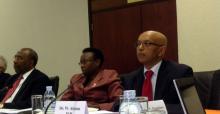Uganda interrupts transmission of river blindness in almost half of the endemic areas
Kampala August 2013 -- Uganda has successfully interrupted transmission of onchocerciasis (River Blindness) in 8 out of 18 localized areas (foci) endemic for the disease and is likely to eliminate it by 2020.
According to the Sixth Uganda Onchocerciasis Expert Advisory Committee composed of national and international experts that met in Uganda from 6th – 8th August, presently, over 1.5 million Ugandans in 6 foci are no-longer at risk of getting this debilitating disease that causes severe itching, skin lesions, eyesight impairment or even blindness if not treated early.
After review of progress made in the last 12 months, the experts concluded that onchocerciasis elimination had been achieved in 2 more foci, that is, Wambabya-Rwamarongo and Kashoya-Katomi covering Hoima, Buhweju, Kamwenge, Ibanda and Rubirizi districts and recommended discontinuation of community-based treatment for River Blindness in areas as well.
If the National Certification Committee (NCC) of the Ministry of Health adopts this recommendation, treatment with ivermectin, currently donated to Uganda by Mercks, a US pharmaceutical company, will stop in the 2 foci in 2014.
The Minister of Health, Hon. Dr. Ruhakana Rugunda, thanked the partners for their continued support to the Onchocerciasis elimination programme that has enabled it to make commendable progress. He informed all present that the Government of Uganda is committed to attaining onchocerciasis elimination by 2020 or before. In line with this, the Government will address the human resource constraints and facilitate cross-border collaboration.
The WHO Country Representative Dr Wondinagenehu Alemu congratulated Uganda on this achievement noting that “indeed Uganda is the lead in Onchocerciasis eliination in the African region” and that many countries have a lot to learn from it..”
Dr Alemu added that the next challenge for Uganda is to ensure that recommendations of the Sixth Uganda Onchocerciasis Expert Advisory Committee are well implemented so as to achieve the desired impact.
He urged partners to support the Ministry of Health to implement the recommendations so that more progress is reported in subsequent meetings. He emphasized the importance of partnership in the effort to eliminate onchocerciasis in Uganda because “no one person or group can achieve it alone”.
Dr Alemu cautioned about cross-border transmission of River Blindness adding that if cross- border collaboration is not enhanced, elimination will be threatened. He pledged WHO support to the country on this aspect.
The Director General of Health Services, Dr. Jane Ruth Aceng noted that Uganda’s success is a clear demonstration that elimination of River Blindness is possible in Africa. It also means that about 3,000,000 ivermectin treatments and more than 8,000,000 tablets are no longer needed.
The job left for health workers is to raise community awareness in the previously affected districts about why ivermectin treatment has been stopped and also embark on the mandatory three-year post treatment surveillance that is done before an area is considered officially free of River Blindness.
At its peak, river blindness, a Neglected Tropical Diseases, affected 35 districts in Uganda putting 3.5 million people at risk. The disease is caused by parasite which is transmitted by bites from female infected black flies that breed in fast flowing rivers.
River Blindness elimination in Uganda started in 2007 when His Excellency The President General Yoweri Kaguta Museveni launched the nationwide elimination strategy.
Since 1996, The Carter Centre has been instrumental in supporting and implementing many onchocerciasis control activities. The Carter Centre has also greatly supported the elimination strategy by providing training, technical and financial support to the country. The Centre also provided support to establish a molecular laboratory at Vector Control Division of Ministry of Health in which essential tests are performed to verify interruption of River Blindness transmission.
Other partners that have offered tremendous support include the River Blindness Foundation, the WHO African Programme for Onchocerciasis Control (APOC), GIZ, Sight Savers, The Lions Clubs International Foundation, Mercks Co Inc and RTI/ENVISION. District and community activity implementation is done by district local governments, District Onchocerciasis Coordinators, supervisors, community medicine distributors and community members.
________________________________________________________________
For more information please contact :
Benjamin Sensasi, Health Promotion Advisor, WHO Country Office
Tel 256-414-335500
Email: sensasib [at] ug.afro.who.int


